Service to the nation, the theme of the Fort McCoy Centennial Commemoration June 13, was the motivation when the installation was established 100 years ago, said the grandson of the installation's founder.
Douglas D. McCoy Jr., a retired Air Force colonel and a speaker at the event, said the same spirit is evident in the personnel training and working at the installation today.
The McCoy family was well represented at the event and included McCoy's 90-plus-year-old mother, the daughter-in-law of the installation's founder, Maj. Gen. Robert Bruce McCoy.
McCoy, who was born after his grandfather died, shared the history of his grandfather and also reminisced about his own experiences at Camp McCoy and Fort McCoy, which included one of his first jobs of setting up pins at a bowling alley at Camp McCoy.
"The proud spirit of public service (both in the military and in civilian life) continues in his extended family," said Douglas McCoy. "(General McCoy) would be proud of the military training dedicated to ensure troop readiness. He would be proud of those who served, (those in) public service and those of you serving now. He would really celebrate the way you have taken his dream and made it bigger and better."
McCoy said his grandfather's public service, included being a county judge and the mayor of Sparta.
"As a judge, my grandfather had a reputation for fairness and the evenhanded application of the law," McCoy said.
His grandfather served in the military during the Spanish American War, the police action in Mexico and World War I. McCoy said one of the forces behind his grandfather's drive to support military training was he saw young men die needlessly because of poor training and a lack of medical treatment during his service.
"(He) never wanted that to happen again," McCoy said. "(With his service my grandfather) saw war as a constant inevitability and the need to better prepare men for it."
His grandfather, who attended the University of Wisconsin-Madison, was an excellent baseball player who played several positions and was good enough to attract an offer to play for a New York professional team. He turned the offer down, however, to return to Monroe County and dedicate his life to public service. He was more interested in improving his community and its people than in his personal gain, McCoy said.
"He wanted to make a difference," Douglas McCoy said. "He was a public servant of the highest order."
His grandfather suffered a number of hardships during his life.
His wife died at the age of 41 in a car accident and left him with seven children. He suffered from a mustard gas attack in World War I and never fully recovered, which McCoy said he believed helped lead to his grand-father's early death at the age of 58 in 1926.
Al Fournier, the deputy to the garrison commander, who served as the master of ceremonies for the event, said the theme for the commemoration was chosen because it embodies what Fort McCoy is really all about.
For 100 years, the installation has been "dedicated to providing our servicemembers and their families the very best support possible," he said. "It isn't just the ranges, the training areas and facilities alone that define an installation. But rather it is the spirit, and the commitment to service embodied in this installation's community that makes Fort McCoy such a special place."
"Here at Fort McCoy that commitment of service to our nation began with the vision of our founder, Major General McCoy, and has continued forward through the succeeding years," he said. "That commitment to service and excellence has become our hallmark, and it is the standard against which we measure ourselves."
Fournier introduced Sen. Russ Feingold of Wisconsin, who served as the keynote speaker, and said the senator has dedicated much of his life to public service.
Feingold, as well as the rest of the Wisconsin Congressional delegation, has been very supportive of Fort McCoy and the training it provides to military personnel who accomplish the country's mission. Feingold played a key role in helping Fort McCoy secure $31 million to improve its facilities and another $14 million for housing as part of the recently passed federal stimulus bill, Fournier said.
"I am so impressed by every aspect of this excellent installation," Feingold said. "(General McCoy) saw the potential of this place to train men."
The support of this installation is not only deserved, it is long overdue, he added. It provides state-of-the-art training to all servicemembers who train here, including Wisconsin servicemembers.
Col. David E. Chesser, garrison commander, and Maj. Gen. James R. Sholar, senior commander, spoke about what the milestone means to Fort McCoy.
"As we celebrate the installation's centennial anniversary, it is important to reflect upon and honor the inspiring legacy, with which we have been entrusted," Chesser said. "With that in mind, I personally want to thank Colonel Douglas McCoy and members of the McCoy family for joining us in this celebration."
Fort McCoy is a thriving installation today because of the visionary leadership and dedicated efforts of Maj. Gen. McCoy more than 100 years ago, he said. The installation's efforts to provide the best training and quality of life have always been its cornerstone.
The installation serves as a crown jewel of Army Reserve training, he said.
In April, the installation received $45 million in stimulus money to upgrade installation facilities, as well as funding to build up to 23 homes on the installation, and he thanked Feingold and Rep. Ron Kind, who also spoke at the event, for their efforts on behalf of Fort McCoy. In addition, the installation has a number of ongoing projects such as new facilities to support the Child, Youth, School and Services program to help support the troops.
"We've also been extremely busy delivering the Army Family Covenant, our commitment to provide Soldiers and their Families a quality of life commensurate with their service," he said.
Scholar said the history of Fort McCoy is the history of the Army.
It is active, pulsating and robust in wartime, and quiet, somber and waiting until called on again during peacetime.
Even though the country doesn't face an enemy as it did on D-Day, 65 years ago, it still faces tremendous challenges, he said.
Global terrorism, extremists and ideologies will continue to threaten the nation's safety and freedom, he said. Americans will pay a great toll unless they are willing and prepared to defend their interests.
"To meet the strategic demands of this nation, we have seen an ever-increasing role of reserve-component forces since September (11) 2001," Sholar said. "As we have seen our reserve-component forces of all services be included in the fight in the overseas conflict, this is a significant shift in their historic role as a strategic reserve. And this requires changes in the way we think about equipping, training and employing our reserve forces."
Fort McCoy is the acknowledged leader in implementing the new Army Reserve training strategies, he said.
With all the things going on at Fort McCoy, including training, new missions and new facilities, the installation's future has never been brighter, he said. "We will carry out the vision and mission of General McCoy as he laid it out 100 years ago."
Raymond G. Boland, the civilian aide to the secretary of the Army, read a statement from Secretary of the Army Pete Geren congratulating Fort McCoy on its 100th anniversary.
Boland, a past commander of Fort McCoy, reminisced about his service in the National Guard at Fort McCoy, beginning as a lowly private in the 32nd Brigade, also known as the Red Arrows. Other members of the 32nd Old-Timers were in attendance and were recognized and honored.
Past commanders Roy L. Higgins and Wilbert W. "Bill" Sorenson, and Command Sgt. Maj. Albert Davidson also were in attendance and were recognized.
"The second vision of Fort McCoy came in the late 1980s (under Sorenson)," Boland said. "The Installation Master Plan was put into place to help modernize (the installation) and take the fort into the next century."
Other highlights of the day, included the cutting of a ceremonial cake, the musical support of the 484th Army Reserve Brass quintet, and the playing of "Amazing Grace" by Douglas Weidenbach on bagpipes. Barb Hegenbarth of Sparta sang the national anthem and "God Bless America."
The ceremony was held near the Veterans Memorial Plaza in the Commemorative Area.
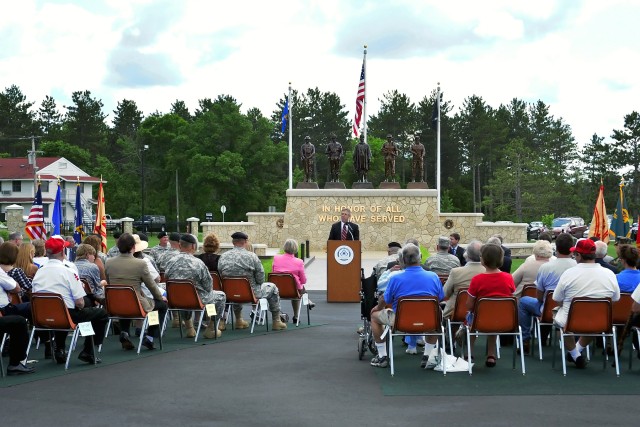
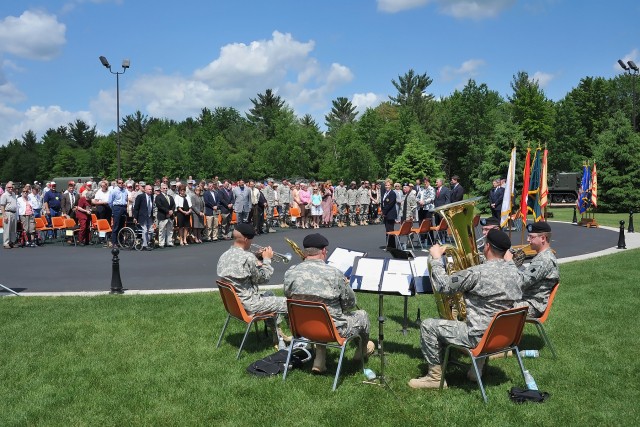
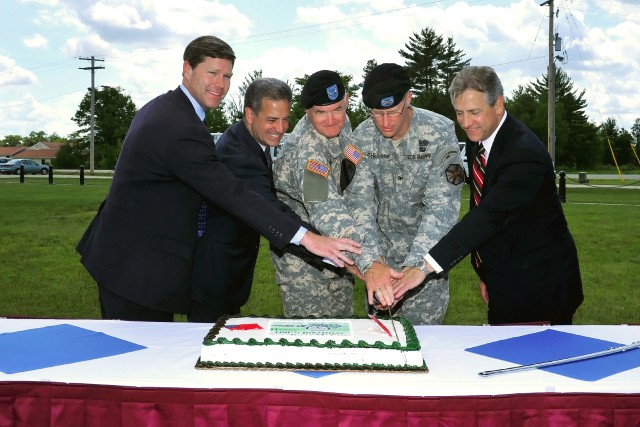
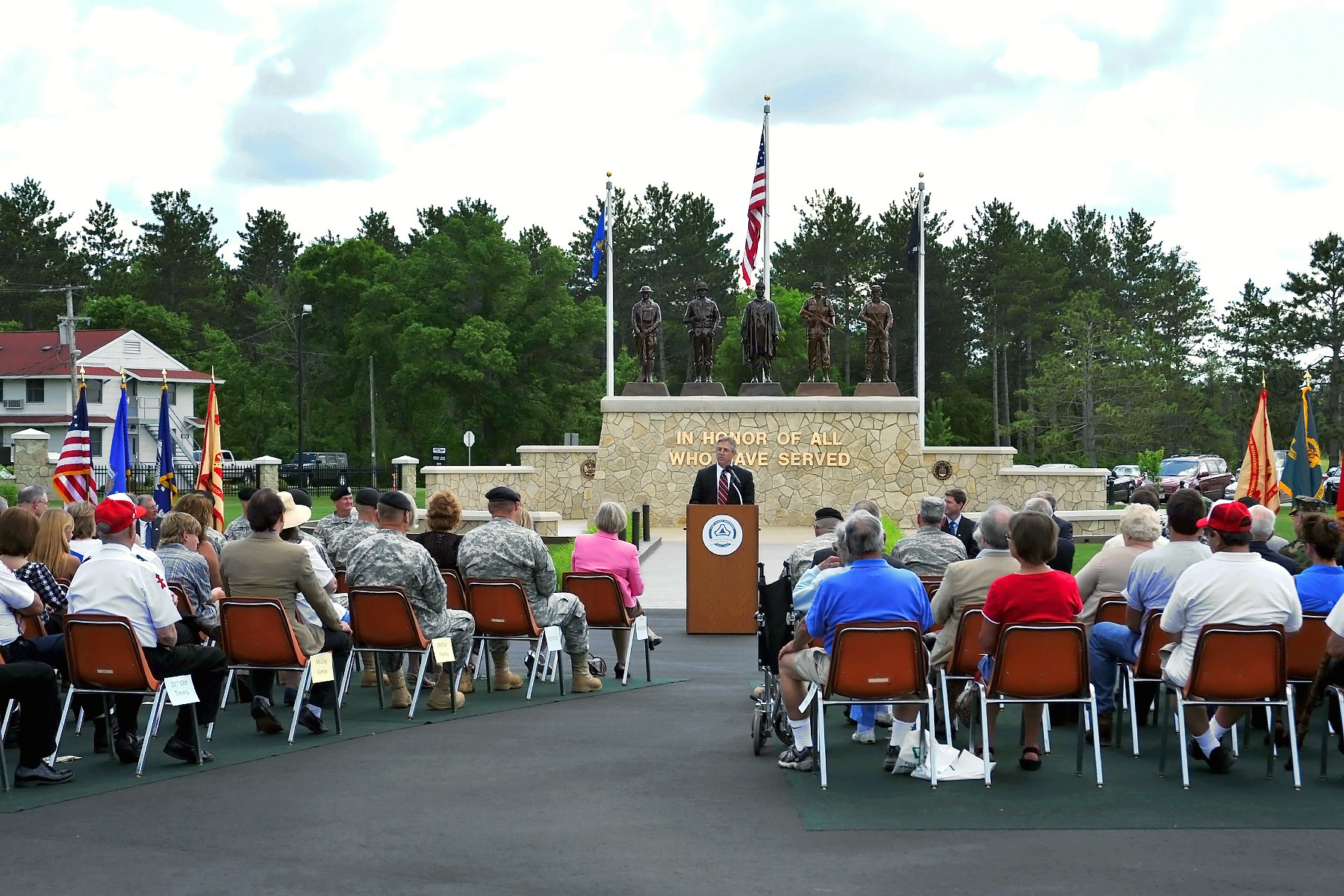
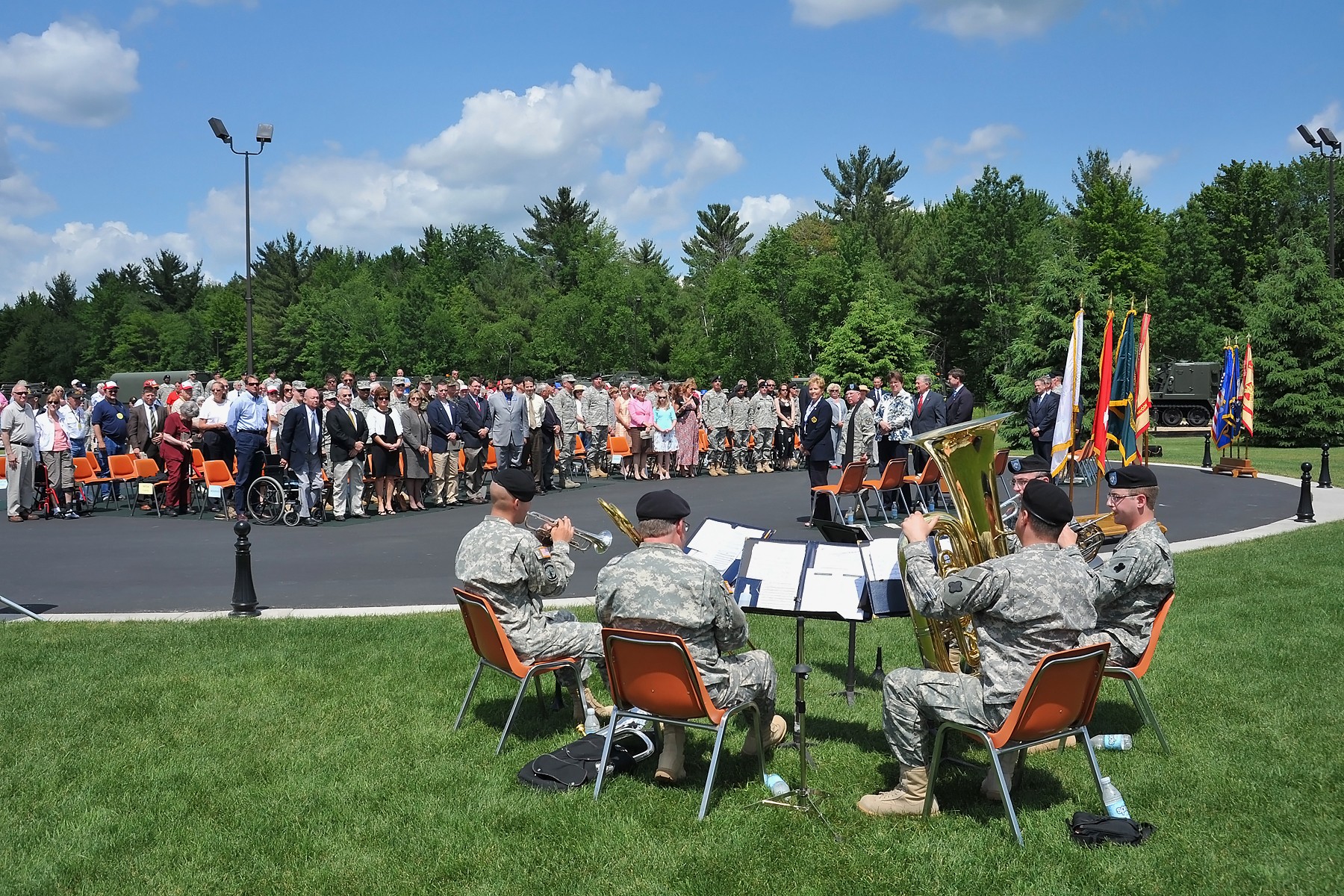
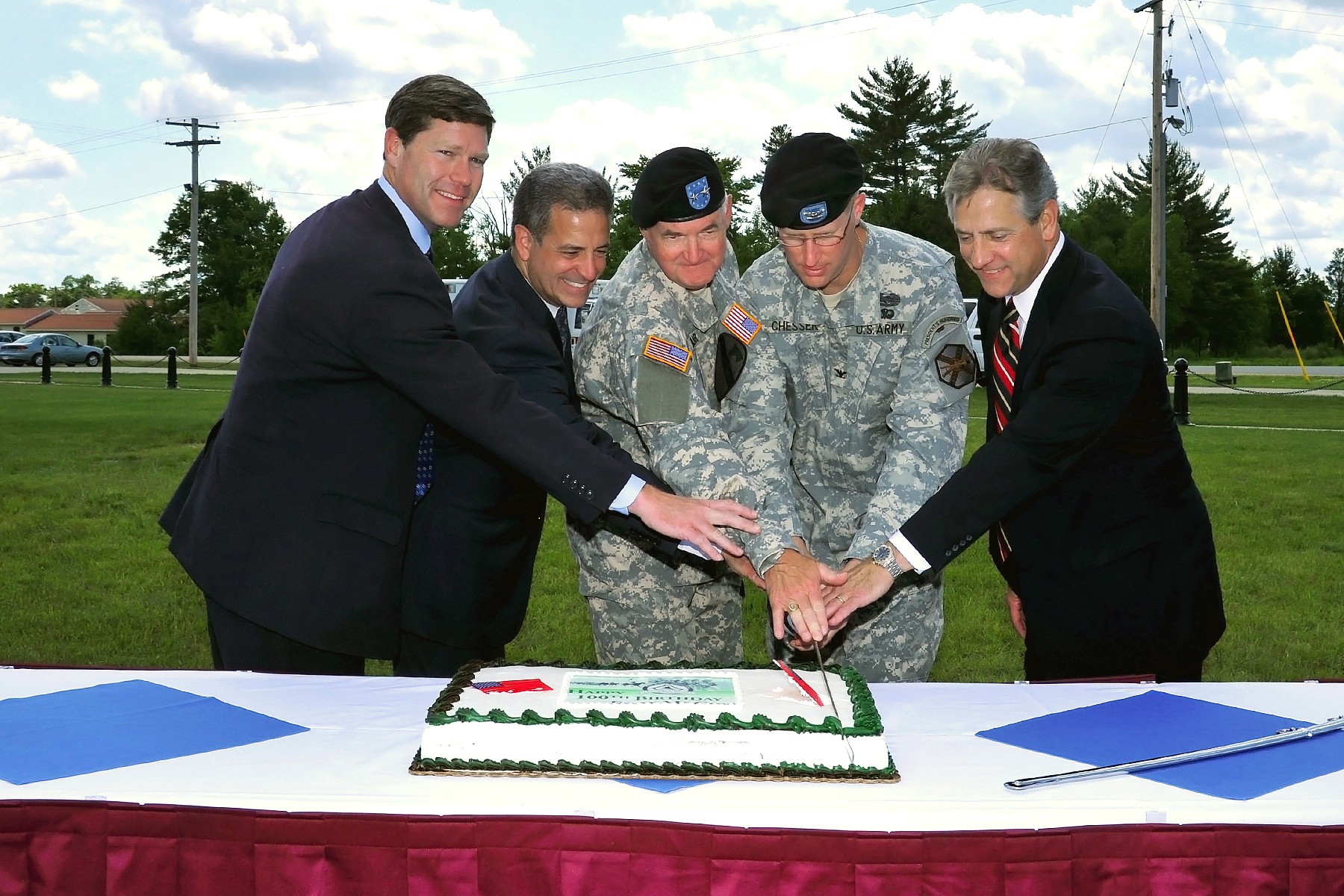
Social Sharing